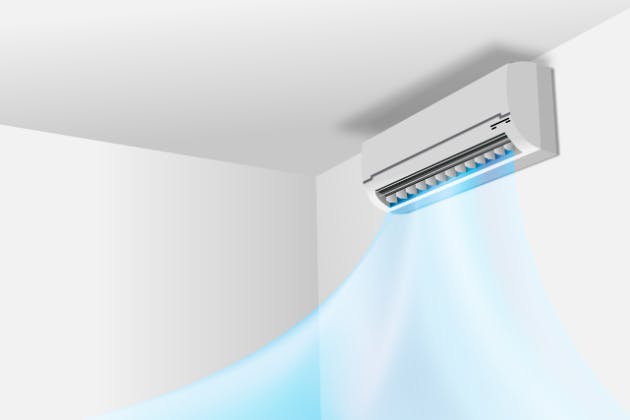When ice forms on your AC unit's coils or refrigerant lines, it's more than just an inconvenience; it's a warning sign of underlying system issues that could result in costly repairs or system failure. Whether you're experiencing poor cooling performance, odd ice buildup, or a total system shutdown, this comprehensive guide will explain the complicated mechanisms that cause AC freezing and offer immediate answers.
Common Causes of an AC Freezing Up

Low Refrigerant Levels
Refrigerant is the lifeblood of any air conditioning system. When levels drop, typically due to undetected leaks, the entire cooling mechanism becomes compromised. The refrigerant circulates through the system, absorbing and releasing heat. Low refrigerant levels create an imbalance in this process, causing the evaporator coil to drop below freezing temperatures.
Ice formation on refrigerant lines, visible frost on the evaporator coil, reduced cooling efficiency, and unusual hissing sounds near the AC unit are all telltale signs of low refrigerant issues.
Dirty or Clogged Air Filters
Air filters act as the first line of defence in your AC system. When they become clogged with dust, debris, and particulate matter, airflow is dramatically restricted. This reduction in air circulation prevents proper heat exchange, causing the evaporator coil to become excessively cold and potentially freeze.
For proper filter maintenance, check filters monthly, replace disposable filters every 1-3 months, use high-quality filters with appropriate MERV ratings, and consider professional cleaning for reusable filters.
Blocked or Closed Vents
Blocked vents disrupt the entire airflow dynamics of your cooling system. Whether obstructed by furniture, curtains, or accumulated dust, restricted vents prevent proper air circulation. This limitation forces the system to work harder, potentially leading to freezing.
For practical vent management, maintain adequate clearance around vents, regularly clean vent covers, ensure furniture isn't blocking airflow, and verify all vents remain fully open.
Broken or Defective Fans
The blower fan is crucial in maintaining consistent airflow. When it malfunctions, air movement across the evaporator coil becomes insufficient, causing temperature imbalances that can result in freezing. Issues often stem from motor wear and tear, damaged fan blades, electrical connection problems, or bearing deterioration.
Clogged Condensate Drain Line
Your AC's condensate drain line removes moisture produced during the cooling process. When this line becomes clogged with algae, mould, or debris, water cannot drain properly. This backup can lead to moisture accumulation and subsequent freezing. Regular maintenance includes flushing with a vinegar solution quarterly and scheduling professional annual cleaning.
Mechanical Problems or Refrigerant Leaks
Beyond simple maintenance issues, complex mechanical problems can cause freezing. These might include kinked refrigerant lines, faulty compressors, damaged coil valves, and refrigerant line deterioration.
Incorrect Thermostat Settings
Improper thermostat programming can inadvertently cause freezing. Running the AC at excessively low temperatures or during cooler outdoor conditions disrupts the system's normal operation. Maintain moderate temperature settings, avoid drastic temperature fluctuations, and consider smart thermostats with adaptive learning capabilities.
Collapsed Air Ducts
Damaged or collapsed ductwork can create significant airflow restrictions, leading to localised freezing within the system. Professional inspection and repair are essential for maintaining proper airflow throughout your system.
Looking for expert help with your frozen AC?
Our team of qualified engineers across Brackley, Milton Keynes, and Northampton can diagnose and fix your air conditioning issues. Contact us today for professional assistance.



